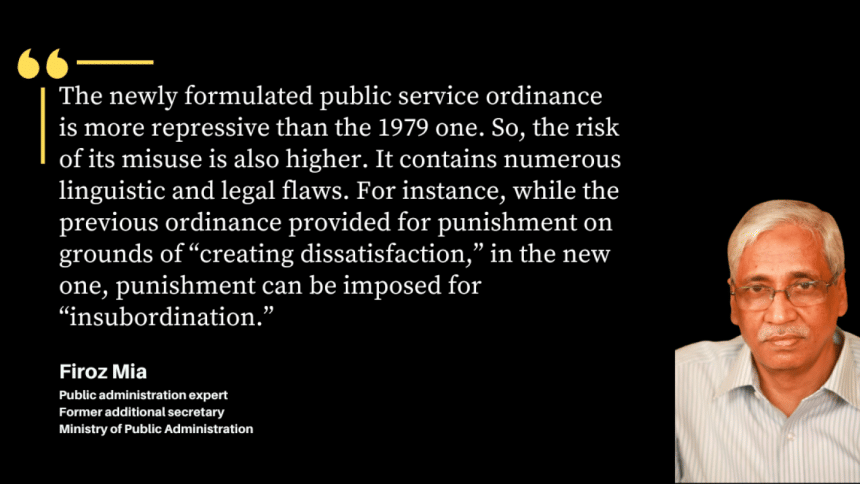‘Only competent leadership, not repressive laws, can fix public administration’

Firoz Mia, a public administration expert, is a former additional secretary at the Ministry of Public Administration and has authored several books on government service. In this interview with Baharam Khan of The Daily Star, he talks about the recently approved Public Service (Amendment) Ordinance and the protests that have erupted at the Secretariat.
How do you view the protests by government employees centring the formulation of the Public Service (Amendment) Ordinance, 2025?
I believe government employees are protesting because of negative experiences they've had in the past. Previously, there was also a law under which punitive action could be taken against employees without any fair investigation.
Can you please elaborate?
The newly formulated ordinance incorporates certain sections from the Government Servants (Special Provisions) Ordinance-1979, which remained in force until 2019. In the past, most of those who lost their jobs under this ordinance were low-ranking employees, who were mostly innocent in an ideal sense. Employee leaders or high-level officers didn't lose their jobs because they were politically influential. Based on these experiences, employees now fear misuse of the ordinance, and their concerns are not unfounded.
How different is the new ordinance from the 1979 one?
The newly formulated ordinance is more repressive than the 1979 one. So, the risk of its misuse is also higher. It contains numerous linguistic and legal flaws. For instance, while the previous ordinance provided for punishment on grounds of "creating dissatisfaction," in the new one, punishment can be imposed for "insubordination." If, say, an honest employee refuses to comply with the orders of a corrupt superior, and is then dismissed on grounds of insubordination, how can you justify it?
According to the new ordinance, even subordinate authorities can declare an accused either guilty or not guilty. This contradicts Article 135(1) of the Constitution. Moreover, the ordinance does not provide for an impartial investigation process for the accused employee, increasing the risk of abuse. Authorities would be able to arbitrarily and whimsically dismiss anyone they choose. This is not acceptable.
Usually, women are not seen in protests by Secretariat employees. But this time many female employees have joined the demonstrations.
Yes, this ordinance could prove more dangerous for women. There is a risk that a morally corrupt officer may file an insubordination charge against a female subordinate who refuses to respond to his indecent advances. Therefore, women have reasons to be alarmed, and their feelings of insecurity are justified.
Are there other aspects of the ordinance that you find unreasonable?
In the civil service, before punishing an accused employee, official notices are served, advertisements are published in newspapers, and notices are also sent to the accused's residence, giving them a specified period to respond. But the new ordinance introduces email as an alternative medium for serving notices. But a person might not check their email for weeks, their email account could be hacked, or they may be in a place with no internet access.
If the authorities take advantage of this to dismiss or penalise an employee, would that be right or humane? If policymakers ignore such underlying issues while drafting laws or ordinances, how will ordinary government employees feel secure?
Doesn't this reflect poorly on those who drafted the ordinance?
Without a doubt, it reflects their inadequacy. Such mistakes are inevitable if the work is rushed or if experienced professionals are not consulted. If Parliament were in session today, many of these details would perhaps have been debated. But with no active Parliament, laws are being amended haphazardly. Moreover, in some cases, even when experts are consulted, senior officers cause trouble by trying to flaunt their intellect. During my service, I've seen many senior officers who knew little about legislation but interfered in such matters just because of their seniority. They think juniors won't consider them competent unless they show off their wisdom.
The ongoing protest is mainly being led by lower-grade Secretariat employees. Why are cadre officers silent?
Laws are enforced mostly on the weak, which is why the weak are protesting. Cadre officers are also backing this movement, but they will not come forward publicly. Another reason is that cadre officers themselves investigate cases of corruption or misconduct involving other cadre officers, and they rarely punish their own. This is one of the reasons behind the current decline of our civil administration.
But government employees have also been frequently involved in questionable activities—don't we need strict laws for dealing with such activities and employees?
There is no denying that government employees have played a role in causing public sufferings through corruption and irregularities. Especially after the mass uprising on August 5, the way some officials held the public hostage is completely unacceptable. However, with competent leadership, I think this could have been handled better. But the current administration has failed in that regard, which is why they are resorting to repressive laws—an approach that cannot effectively manage the civil service crisis.
Then what is the way to handle it?
Strict enforcement of existing regulations and appointment of competent and credible officers—that's the way forward. Only after that can we consider stricter laws or ordinances, but those must not be repressive. Employees must be given the opportunity to defend themselves properly.
But are government employees allowed to protest like this?
In principle, they are not supposed to. But when the government tries to impose repressive laws and regulations, the legitimacy of such protests emerges. So, the solution is not suppression. Capable and honest officers must be appointed who can lead, and they must be allowed to work independently without being bogged down by any external or political influence.
What would be your final message?
As I've said before, appoint officers with integrity. At the same time, there must not be any room for political or vested interests interfering in their work. If the authorities believe that only those officers and employees who follow their orders are "good," then the administration will not function as expected. The government must ensure that public servants are acting in accordance with laws and are not engaging in corruption. Only then will the administration be set right.
Follow The Daily Star Opinion on Facebook for the latest opinions, commentaries and analyses by experts and professionals. To contribute your article or letter to The Daily Star Opinion, see our guidelines for submission.

 For all latest news, follow The Daily Star's Google News channel.
For all latest news, follow The Daily Star's Google News channel. 








Comments